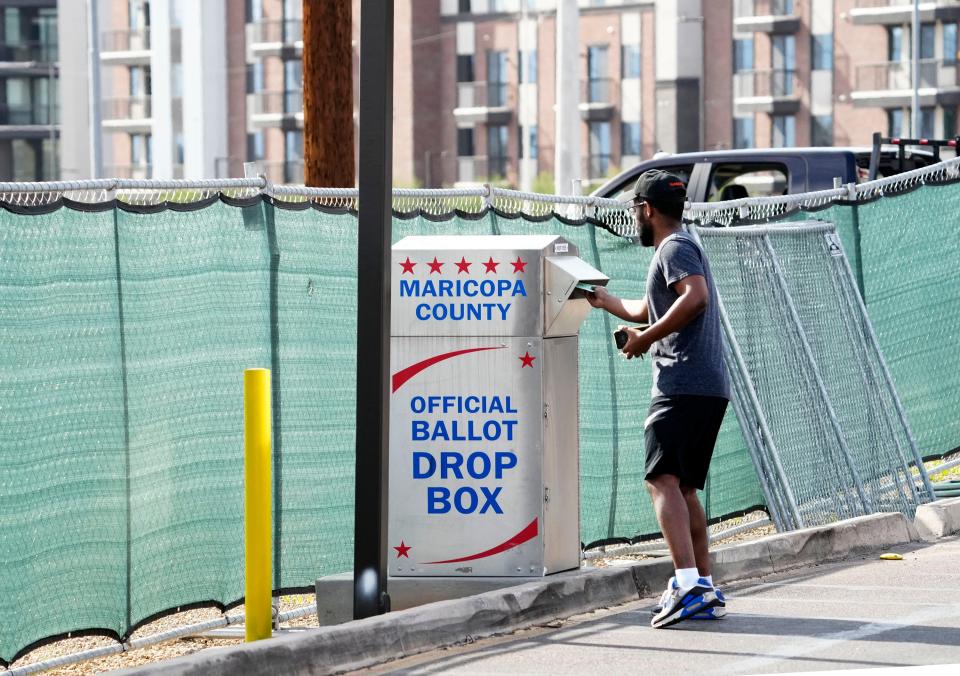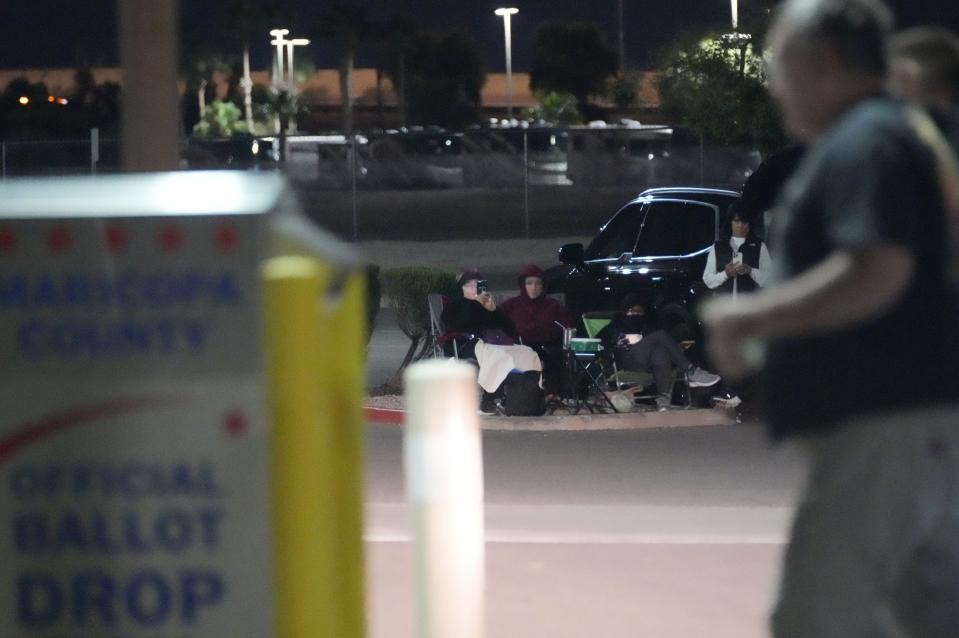Yavapai County judge rules unmanned ballot drop boxes are legal in Arizona
A Yavapai Superior Court judge ruled Thursday that unmanned ballot drop boxes are here to stay in a case that could have monumentally shifted how Arizonans vote on the eve of the state primary and general elections.
Judge John Napper also ruled that election officials can continue using a variety of voter signature samples while verifying signatures on early ballots.
His decision comes in response to two suits filed last year by the Arizona Free Enterprise Club against Arizona Secretary of State Adrian Fontes. The conservative grassroots organization has challenged a variety of statewide voting practices in court. Napper filed rulings in both cases at the same time in one minute entry.
In an earlier lawsuit, the group argued that election officials should only compare signed early ballot affidavits against voters' signatures on their voter registration forms. Historically, election officials have compared signatures on early ballots to those in any election-related document submitted by the voter, including signature rosters and prior signed early ballot affidavits.
The Arizona Free Enterprise Club was joined in that suit by Restoring Integrity and Trust in Elections, a legal group that seeks to tighten voting rules nationwide. The organization is headed by Derek Lyons, who previously served as White House staff secretary and counselor to former President Donald Trump.
Attorney Kory Langhofer, who represented the Arizona Free Enterprise Club in the case, said the suit will be appealed.
"Fundamentally, this is a case about legal issues, so it's a case that was always made for appeal," he said. "We had to go to the trial court first. But everyone, including the judge, knew it wasn't the last stop."
Fontes said Thursday that he was "very glad" that the court "acted swiftly" in the cases.
"I look forward to more victories in the months to come," he said through a spokesperson. "It is unfortunate for the taxpayer that we have to keep going through this revolving door, but it is great for democracy because it shows that we are consistent with our understanding of the law, which allows us to keep winning for the voters."
Scot Mussi, executive director of the Arizona Free Enterprise Club, didn't respond to The Arizona Republic's request for comment on both cases. Attorney Timothy La Sota, who is representing the Arizona Free Enterprise Club in the ballot drop box suit, didn't immediately respond to a request for comment.
Arizona elections: Kari Lake conceded her election defamation case. But she doesn't want to turn over records
Ballot drop boxes can remain unstaffed
The ballot drop box suit pointed to a recent case in which the Wisconsin Supreme Court found unstaffed drop boxes weren't allowed under state law.
It questioned whether Fontes could include rules for such drop boxes in his Elections Procedures Manual. That's a document that instructs officials on how to comply with Arizona's election statutes, ensuring election practices are consistent statewide.
The suit argued all outdoor drop boxes should be monitored by election officials on site.
Elections officials from across the state warned in October the lawsuit could result in thousands in extra costs for counties and less accessibility for voters. They said ballot drop boxes are popular with voters, particularly those who live in rural areas or on tribal lands.
Officials also said the boxes are safe and secure. Yavapai County's boxes each have different keys and include fire suppression mechanisms, said Chief Deputy Recorder Karen McCracken. Pinal County Recorder Dana Lewis said her drop boxes are GPS-tracked. In Maricopa County, they are equipped with tamper-proof tabs, said Recorder Stephen Richer.
All three said their drop boxes are under constant security camera surveillance and that bipartisan teams transport ballots from the boxes to election officials.
Napper echoed similar sentiments in his ruling, writing in his order that the state's current elections rulebook requires certain safeguards that ensure boxes are appropriately "staffed" even if they aren't being actively monitored by an election official.
"The Legislature has not required that these drop-boxes always be monitored," Napper wrote. "The decision to use staffed but unmonitored drop-boxes is within the discretion of the Secretary."
Judge rules in favor of current rules for signature samples
In a March hearing on the suit challenging signature verification procedures, Napper noted the passage of a new law designed to ensure the state's recently widened recount margin won't disrupt this year's elections.
That law embedded signature verification guidelines in state statutes. But it didn't clarify the definition of a voter's "registration record," which determines what signature samples election officials can use while verifying signed early ballot affidavits.
The state's new Elections Procedures Manual defines that as any signature in any election-related document available to election officials. The Arizona Free Enterprise Club and Restoring Integrity and Trust in Elections argued in their complaint that the definition should be narrowed to only include signed voter registration forms.
Napper said at the hearing that state lawmakers could have clarified the discrepancy in their new legislation if they thought Fontes's interpretation of a voter's "registration record" was incorrect.
"The Legislature was certainly aware of how registration record had been defined," he said. "They did nothing to correct a perceived error in how the secretary had been interpreting it. If the Legislature had wanted to change the way that definition had been constructed, they would have done so."
He echoed that argument in his Thursday ruling, writing that state lawmakers "included much of the language" from the state's election rulebook in their new election calendar legislation.
"Using this definition also harmonizes other portions of the Arizona elections statutes," Napper wrote.
Sasha Hupka covers county government and election administration for The Arizona Republic. Do you have a tip to share on elections or voting? Reach her at sasha.hupka@arizonarepublic.com. Follow her on X, formerly Twitter: @SashaHupka. Follow her on Instagram or Threads: @sashahupkasnaps.
This article originally appeared on Arizona Republic: Yavapai County judge: Ballot drop boxes can remain unmonitored in 2024


